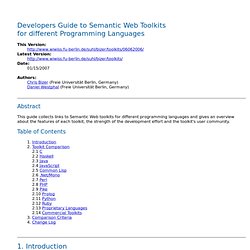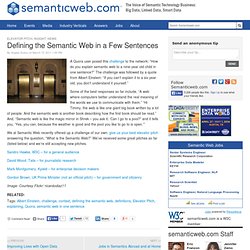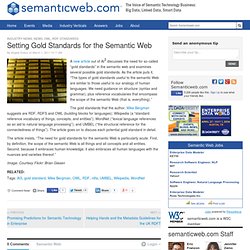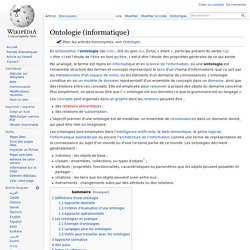

Index (SemWeb.Pro) Textures. Designing. Mind Mapping.
Developers Guide to Semantic Web Toolkits for different Programming Languages. Abstract This guide collects links to Semantic Web toolkits for different programming languages and gives an overview about the features of each toolkit, the strength of the development effort and the toolkit's user community.

Table of Contents This guide collects links to Semantic Web toolkits for different programming languages. We evaluate for each toolkit: which features are offered (APIs, query languages, storage, reasoning support), the strength of the development effort (number of developers involved, latest release), the activity level of the toolkit's user community (number of downloads, active mailing list). Our current evaluation results are found below. Request for Support We are trying to keep this guide up-to-date. If you know about a toolkit that we have missed, it would be nice if you could send us a link. All hints are highly appreciated. Alternative Toolkit Lists Other, alternative toolkit lists are found at 2.2 Haskell 2.4 JavaScript 2.5 Common Lisp 2.6 .Net/Mono 2.9 Pike.
Semantic MediaWiki. Q&A - SATisfiability, ontologies. Jena Semantic Web Framework. Defining the Semantic Web in a Few Sentences. A Quora user posed this challenge to the network: “How do you explain semantic web to a nine-year old child in one sentence?”

The challenge was followed by a quote from Albert Einstein: “If you can’t explain it to a six year old, you don’t understand it yourself.” Some of the best responses so far include, “A web where computers better understand the real meaning of the words we use to communicate with them.” “Hi Timmy, the web is like one giant big book written by a lot of people. And the semantic web is another book describing how the first book should be read.” And, “Semantic web is like the magic mirror in Shrek – you ask it, ‘Can I go to a pool?’ We at Semantic Web recently offered up a challenge of our own: give us your best elevator pitch answering the question, “What is the Semantic Web?” Sandro Hawke, W3C – for a general audience David Wood, Talis – for journalistic research Mark Montgomery, Kyield – for enterprise decision makers Image: Courtesy Flickr/ ricardodiaz11. Setting Gold Standards for the Semantic Web. A new article out of AI3 discusses the need for so-called “gold standards” in the semantic web and examines several possible gold standards.

As the article puts it, “The types of gold standards useful to the semantic Web are similar to those useful to our analogy of human languages. We need guidance on structure (syntax and grammar), plus reference vocabularies that encompass the scope of the semantic Web (that is, everything).” The gold standards that the author, Mike Bergman suggests are RDF, RDFS and OWL (building blocks for languages); Wikipedia (a “standard reference vocabulary of things, concepts, and entities”); WordNet (“lexical language references as an aid to natural language processing”); and UMBEL (“the structural reference for the connectedness of things”). The article goes on to discuss each potential gold standard in detail. The article insists, “The need for gold standards for the semantic Web is particularly acute. Image: Courtesy Flickr/ Brian Giesen. Ontologie (informatique) Un article de Wikipédia, l'encyclopédie libre.

Par analogie, le terme est repris en informatique et en science de l'information, où une ontologie est l'ensemble structuré des termes et concepts représentant le sens d'un champ d'informations, que ce soit par les métadonnées d'un espace de noms, ou les éléments d'un domaine de connaissances. L'ontologie constitue en soi un modèle de données représentatif d'un ensemble de concepts dans un domaine, ainsi que des relations entre ces concepts. Elle est employée pour raisonner à propos des objets du domaine concerné. Plus simplement, on peut aussi dire que l' « ontologie est aux données ce que la grammaire est au langage ». L'objectif premier d'une ontologie est de modéliser un ensemble de connaissances dans un domaine donné, qui peut être réel ou imaginaire. Les ontologies informatiques sont des outils qui permettent précisément de représenter un corpus de connaissances sous une forme utilisable par un ordinateur.
Notes. Moteur d'inférence.
OWL. .bodycard 1573.